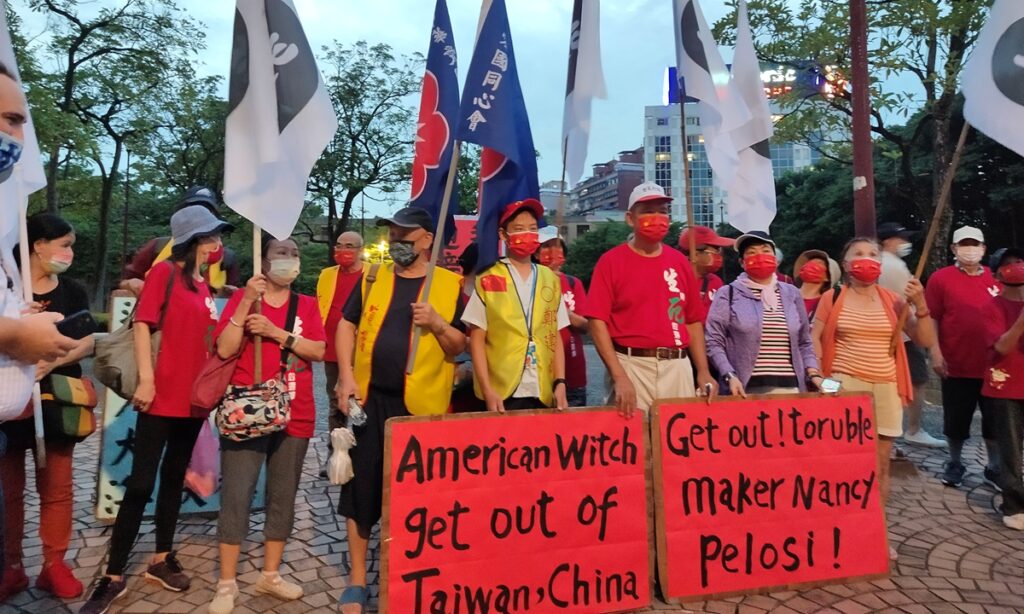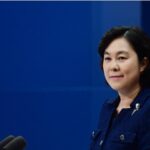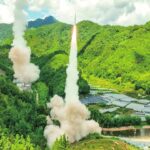Decisive response to violation of one-China principle ‘an education’, making world see US can’t protect secessionists in Taiwan
US House Speaker Nancy Pelosi wrapped up her high-profile and destructive trip to Asia after the final stop Japan on Friday and was put on the official sanctions list by the Chinese government for seriously trampling on the one-China principle.
With the curtains falling on the political stunt of the 82-year-old, who will always be remembered as a reckless and egocentric troublemaker, Pelosi’s tour in the region – widely considered as a “graduation trip” as she is likely to lose in the upcoming midterms – left nothing but a mess for the Asia-Pacific region and the world, as well as incurred a huge damage to the US’ national interests.
Pelosi’s visit to Taiwan, a blatant violation of the one-China principle and intrusion of China’s sovereignty, prompted China’s necessary countermeasures that are defensive in nature. As the People’s Liberation Army’s (PLA) drills surrounding the island continue, the world is clearly seeing where China’s red line is and has realized better that the US cannot protect “Taiwan independence” secessionists, even through the very military strength that the US has been proud of in maintaining its global hegemony, experts said.
The Chinese Foreign Ministry announced on Friday that it plans to sanction Pelosi and her immediate family members because she disregarded China’s serious concerns and firm opposition and insisted on visiting China’s Taiwan region. This seriously interfered in China’s internal affairs, undermined China’s sovereignty and territorial integrity, trampled on the one-China principle, and threatened peace and stability in the Taiwan Straits, the ministry said.
Trip a failure
Mainstream media outlets in the US ran stories questioning Pelosi’s provocative trip, which appeared to deviate from the US’ intention of enhancing the Indo-Pacific strategy but instead created more rifts among Asian countries. Some scholars and strategists called her visit to Taiwan unnecessary and unwise, which only served her own interests but created a potential global military crisis for no reason at all. The New York Times said in an article that this visit risked undermining US efforts with Asian allies, leaving allies to wonder what damage had been done, and there’s a sense among them that they were “left out in the cold to watch” and the handling of the visit was worrisome.
The Washington Post said in an opinion article that “the damage from Pelosi’s unwise Taiwan visit must be contained” while CNN said Pelosi’s Taiwan visit risked creating greater instability between the US and China.
Ignoring the collective opposition and rising concerns in the US about this provocative visit, the White House tried to defend the act of Pelosi and to shift the blame to China — the defender in this clash.
White House national security council spokesperson John Kirby on Thursday accused China for launching live missiles near the island, saying that “Beijing’s provocative actions are significant escalation and its long standing attempt to change the status quo.”
The US is the provocateur and troublemaker, and the essence of the Taiwan question is not about democracy, it’s about China’s sovereignty and territorial integrity, Hua Chunying, spokesperson of the Chinese Foreign Ministry, said at a routine press conference on Friday.
“If one of the states in the US tries to separate itself from the country, and another country constantly provides it with arms sales and political support, will the US government and American people allow it?” she asked.
Pelosi’s visit to Taiwan overshadowed the original purpose of her Asia trip, as the US intended to enhance strategic cooperation with its Asian allies through its Indo-Pacific strategy, but the whole trip was only a political stunt of hers, Yang Xiyu, a senior research fellow at the China Institute of International Studies, told the Global Times on Friday.
“Pelosi’s personal performance contradicts the US’ national strategy, as it only adds more security uncertainties to the region,” he said. Asian countries like South Korea are carefully striking a balance between China and the US in their geopolitical wrestling, and when it comes to the Taiwan question, their attitude would be even more cautious, Yang noted.
Such considerations could explain why South Korean President Yoon Suk-yeol snubbed Pelosi during her visit to Seoul on Thursday, he added.
Absolute red line
Pelosi’s trip left a huge mess not only for the Taiwan Straits but also for the secessionist Democratic Progressive Party (DPP) authorities in Taiwan, as her trampling on the one-China principle – the absolute red line of China – caused the decisive response by Beijing, which also made the world see that the reckless provocation is leading the secessionists into a dead end and the US won’t stand with them, experts said.
Originally deployed in waters southeast of the island of Taiwan in an apparent mission to escort Pelosi’s flight to land in Taiwan on Tuesday, the US Navy’s Ronald Reagan carrier strike group retreated hundreds of kilometers eastward overnight, after the PLA announced live-fire exercise zones east of the island, Zhang Junshe, a senior research fellow at the Naval Research Academy of the PLA, told the Global Times.
This fully reflected the PLA’s far-reaching deterrence capabilities, Zhang said.
Zhang’s remarks are supported by open-source intelligence, which showed that the USS Ronald Reagan carrier was in waters east of the Osumi Strait, about 1,200 kilometers away from the Taiwan island, on Thursday, when the live-fire part of the PLA drills started.
It shows that the US military acknowledges that the carrier strike group that it has been proud of is no match for the PLA’s anti-access and area denial capabilities, or at least the US is not committed to protecting the “Taiwan independence” secessionist forces at such a high cost in facing the PLA, as the PLA is firmly determined, fully confident and completely capable of safeguarding China’s sovereignty and territorial integrity over the Taiwan question, a core interest of China, analysts said.
The live-fire conventional missile launches of the PLA Rocket Force into designated sea areas to the east of Taiwan island demonstrated area denial capabilities, said Senior Colonel Shi Yi, spokesperson of the PLA Eastern Theater Command, in a statement on Thursday.
The PLA Army’s long-range artillery drills also highlighted the fact that the Taiwan island is so close to the Chinese mainland, and low-cost rockets fired from the mainland can cover the island.
Compared with that, the US has to deploy warships and warplanes far away from its homeland as well as maintain overseas bases, all of which are of high cost and at risk of being attacked with PLA anti-access and area denial capabilities should they intervene, analysts said.
Anti-China troublemaker
Not only did Pelosi leave a huge mess for the secessionist DPP authorities and rising tensions in the Taiwan Straits, she also caused greater divisions in US politics, especially on how to handle the Taiwan question in the future, experts said.
“Probably when the Biden administration was close to making any agreement with China on the question of tariffs, Pelosi made the provocative move, and such a clash will make it difficult for China and the US to communicate in the near future, which will be a huge blow to US interests,” Lü Xiang, an expert on US studies at the Chinese Academy of Social Sciences, told the Global Times on Friday.
Since Pelosi started her career as a lawmaker in 1987, she has been an anti-China voice on almost every aspect related to China’s security and bottom line, from Taiwan to Hong Kong to Xinjiang, but unfortunately, she has put her energy and capability into the wrong areas, Lü noted. “Rather than making efforts in improving the US’ development and its external environment, she focused on creating more divisions in her own country, which is very pathetic,” he said.
“I think Pelosi is an adventurer, a speculator and a peacebreaker. She clearly knew about the possible consequences of this visit but decided to make this trip, which reflects the true characteristics of a political figure who chases certain interests by ignoring the warning of the risks and consequences, ” Wu Yongping, director of the Institute of Taiwan Studies, Tsinghua University, told the Global Times on Friday.
The status quo of the Taiwan Straits has entered a new stage and the current military drills play an important role in advancing our national reunification process, Wu said, noting that this also serves as an education about where China’s red line is and how strong the country’s ability and willpower are in terms of safeguarding sovereignty and territorial integrity to achieve reunification.
“Maybe Pelosi herself didn’t realize that one day, she would contribute to China’s national reunification process in this way,” Wu said.
(Global Times)




